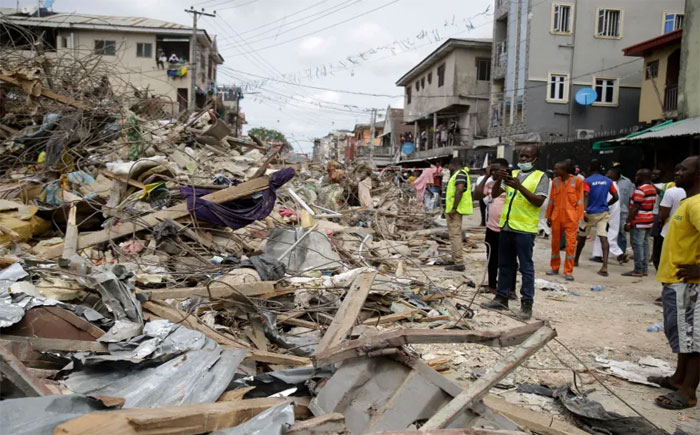
The first crack sounded like a Christmas banger—one sharp pop, then a sigh of concrete giving up. By the time the dust settled, half of No. 15 Ago Palace Way had folded into itself like a badly dealt pack of cards, taking with it the dreams (and maybe the lives) of everyone still inside at 2:17 a.m.
“I Thought It Was the Transformer” Bose Ogunnaike, 28, fries akara at the junction each night. She was turning the last scoop of beans when the ground trembled. “I thought NEPA had blown the transformer again,” she says, eyes still glazed from the smoke of her own oil.
“Then I saw the roof skip a heartbeat and disappear.” What vanished was a two-storey mixed-use block: three shops on the ground floor—Mama Ejima’s pepper stall, a makeshift POS kiosk, and a 24-hour viewing centre where boys watch European football on credit—and eight rooms upstairs, most of them carved into “face-me-I-face-you” cubicles by a landlord who swore the original architect said “you can add another deck later.”
By 2:29 a.m. the first okada rider had dialled 767. Lagos State Emergency Management Agency (LASEMA) and NEMA trucks arrived to find a hillside of rubble: twisted iron rods, fragments of green bathroom tiles, a single blue school sandal with Frozen stickers.
They brought in two sniffer dogs—Max, a German shepherd, and Roxy, a Belgian malinois—whose previous biggest find was a missing toddler in Oyingbo Market.
Tonight they worked in shifts, nostrils flaring at every pocket of air.
Between whimpers, rescuers heard the faint ring-tone of someone’s phone trapped beneath a slab; it played the gospel hit “Ekwueme” on repeat, a cruel lullaby in the dark.
Fifteen people have been pulled out alive so far:
A 6-year-old boy wedged inside a rusted deep-freeze that doubled as a cupboard.
A newly-wed couple still clutching their marriage certificate folder—ink smudged but legible.
A night-guard who insists he was “only dozing on a plastic chair” when the stairwell kissed the ground.
But the dogs keep barking at one corner where a concrete beam rests at a 45-degree angle.
Rescuers believe at least six voices answered the roll-call there an hour ago; now only silence.
Building approval records at the Lagos State Physical Planning Authority list No. 15 as a “single-storey neighbourhood store” granted in 2008.
Somewhere between then and now, an extra floor grew—no amended drawing, no structural test, just the ambition of a landlord nicknamed “Alhaji Double” for his habit of stacking everything: wives, floors, even the betting slips he hands agberos each weekend.
Neighbours say renovation started in March after a mysterious buyer promised to convert the upper rooms into “executive short-let apartments” for election observers.
Day labourers poured wet concrete during the April rains; one carpenter jokes he saw cement bags marked “Not for structural use—tile adhesive only.”
The site engineer, when reached by phone, claimed he was “only a consultant for the painting aspect.” His certificate of insurance expired in 2021.
At 9:00 a.m. a 50-tonne mobile crane crawled in from Ikorodu, chewing up the potholes on Ago Palace Way. Each lift of debris takes 12 minutes; every creak of the crane’s cable hushes the crowd as if sound itself could topple the rest.
A woman in a yellow Ankara wrapper beats her chest each time a body-shaped stretcher is carried out. She has two sons in there—Tunde, 19, an apprentice welder, and Lekan, 16, who sells cold sachet water at the viewing centre. She hasn’t decided which missing-person tent to sit in, so she stands between both, switching her cry from “Tunde!” to “Lekan!” like a broken traffic light.
The Governor Came, Promised, Left
By 11:15 the state commissioner, flanked by aides filming for Instagram Live, announced:
“We will foot every medical bill and get to the root of this.” The crowd answered with a collective hiss—part anger, part resignation. Someone shouted, “We’ve heard that song since 1999!”
The governor’s convoy sped off, siren wailing, scattering the same okada riders who had ferried victims to hospital hours earlier.
The Met Office predicts thunderstorms by 4 p.m.; rescuers have tarpaulins ready but fear water will seep into air pockets and collapse them. NEMA’s spokesperson, leaning against the yellow tape, admits:
“Every hour reduces probability of survival. We expect figures to change—upward—before sunset.”
Translation: more bodies, fewer miracles.
Epilogue: A Street That Refuses to Sleep
By midday, viewing-centre chairs still stand in perfect rows, facing a TV screen that now displays rubble instead of Ronaldo.
A betting slip flutters in the breeze—Barcelona to win, odds 2.30, stake ₦100.
The match ended weeks ago; the punter never collected. Tonight, Bose will wheel her akara basin back to the junction. She says she’ll keep the oil hot, just in case Tunde and Lekan emerge hungry, just in case the crane lifts one more slab and finds a pocket of hope. And if they don’t?
She stares at the collapsed mound, wipes her hands on her apron, and answers with the pragmatism of a city that has buried its children under concrete and still hustles for tomorrow:
“Then I will fry for the ones who are still here. Somebody must eat.”
This has been The Red Hot Report from Pepper-Room. The news that bears it all.
www.pepperroom.com.ng #pepperroomnews #pepperroomng #pepperroom
Lagos, Nigeria.
+234 913 161 4181
+234 802 586 9823
+234 803 961 8550
info@pepperroom.com.ng
© 2025 | 🌶️Pepper-Room - Everything Loud, Wild, and Worth Talking About. | All Rights Reserved.
Pepper-Room is not responsible for the content of external sites.